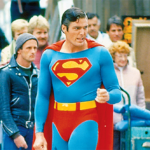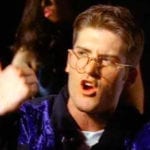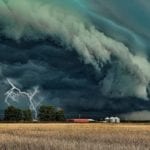 Weird Stuff
Weird Stuff  Weird Stuff
Weird Stuff  Food
Food 10 Modern Delicacies That Started as Poverty Rations
 Movies and TV
Movies and TV 10 Shared TV Universes You’ve Likely Forgotten About
 Weird Stuff
Weird Stuff 10 of History’s Greatest Pranks & Hoaxes
 Miscellaneous
Miscellaneous 10 LEGO Facts That Will Toy with Your Mind
 Misconceptions
Misconceptions 10 Widespread Historical Myths and the Texts That Started Them
 Crime
Crime 10 Incredible Big-Time Art Fraudsters
 Movies and TV
Movies and TV 10 Most Influential Fictional Objects in Cinema History
 Our World
Our World Top 10 Real Almost‑Cities That Never Materialized
 Technology
Technology 10 Unsettling Ways Big Brother Is (Likely) Spying on You
 Weird Stuff
Weird Stuff The 10 Unluckiest Days from Around the World
 Food
Food 10 Modern Delicacies That Started as Poverty Rations
 Movies and TV
Movies and TV 10 Shared TV Universes You’ve Likely Forgotten About
Who's Behind Listverse?

Jamie Frater
Head Editor
Jamie founded Listverse due to an insatiable desire to share fascinating, obscure, and bizarre facts. He has been a guest speaker on numerous national radio and television stations and is a five time published author.
More About Us Weird Stuff
Weird Stuff 10 of History’s Greatest Pranks & Hoaxes
 Miscellaneous
Miscellaneous 10 LEGO Facts That Will Toy with Your Mind
 Misconceptions
Misconceptions 10 Widespread Historical Myths and the Texts That Started Them
 Crime
Crime 10 Incredible Big-Time Art Fraudsters
 Movies and TV
Movies and TV 10 Most Influential Fictional Objects in Cinema History
 Our World
Our World Top 10 Real Almost‑Cities That Never Materialized
 Technology
Technology 10 Unsettling Ways Big Brother Is (Likely) Spying on You
10 Of The Creepiest Commercials To Ever Hit The Small Screen
The average commercial ad runs for about 30 seconds or less. That leaves companies with little time to sell a product to the viewer and outwit the competition, and withering audience attention spans are tempting more and more companies to rely on shock value. Unfortunately, these tactics tend to be hit-or-miss. Hits include commercials such as the E*TRADE baby and the overly sexual Quizno’s toaster, while the misses of the group seem to have confused shock value with mental scarring. Here are 10 of those misses.
10Kinder Surprise
This 1980s commercial was originally created to help sell those horrible chocolate eggs filled with a “surprise” item inside. It features a nightmarish Humpty Dumpty knockoff that Italian candy company Ferrero believed would sell more product. The company’s CEO at the time, Michele Ferrero, apparently didn’t realize that an increase in sales wasn’t linked to the emotional scarring of children.
Kinder Surprise eggs have been banned from the United States due to an FDA ruling banning confectionery products with embedded non-nutritional objects. The fine for violating this act is currently $2,500. In 2012, Brandon Loo and Christopher Sweeney had a candy-related run-in on their way back to the US from Canada when border patrol agents found them in possession of the illicit ova, meant to be exotic treats for American family and friends. Since neither man knew the eggs were illegal, they were let off with a warning.
9#PubLooShocker
Passed around under the hashtag #PubLooShocker, this viral video was actually a PSA warning against the dangers of drunk driving, produced by London’s Department of Transportation as part of their “Think!” campaign. The campaign’s aim is to stop drunk driving and and related deaths by any means necessary, including scaring unsuspecting strangers.
Though the #PubLooShocker video is just 52 seconds long, it packs several jump-worthy moments in that short span as several “drinkers” visit a bar restroom and end up cowering in fear. Once inside, the drinkers are caught unawares by a bloody mannequin head as it smashes through the mirror from behind, accompanied by the sound of an actual car crash and a hail of screams, resembling the outcome of a DUI accident.
The video quickly went viral, racking up hundreds of thousands of views in just a day. It was part of the creative communications company Leo Burnett London’s “Change” collective, which features various other projects that send powerful messages. It is also the last ad the company will be making for the London Department of Transportation.
8Little Baby’s Ice Cream
Just when you thought there was nothing in the world that could make ice cream even remotely disturbing, this commercial came along to shatter your worldview and also part of your soul. Released by a small ice cream shop in Philadelphia, “This is a Special Time” features an asexual non-human named Malcolm who is apparently made out of ice cream. Over the course of the video, we watch in disbelief as Malcolm consumes himself with a spoon.
When asked about the commercial, company co-founder Pete Angevine told Philadelphia Weekly, “I came to realize that ice cream is a blank canvas, and you can just let your imagination go wild.” Pete certainly seems to have an active imagination, to say the least. Little Baby’s Ice Cream is a repeat offender: Apparently having decided that one commercial starring the self-cannibalistic Malcolm just wasn’t enough, they made another.
7Phones 4u
Believe it or not, this is indeed a phone commercial. It’s actually part of a series of commercials from 2011 by UK mobile phone retailer Phones 4u. The ads were conceived by Aidan McClure and Laurent Simon and directed by Garth Jennings through production company Hammer & Tongs. The campaign was created with the hope of widening the retailer’s demographic from 18–24 to 18–34 and generating controversy that would lead to more overall awareness of the company and increase potential sales. Though complaints were filed to the company, the company issued a statement that the ad was meant to “build tension,” not to scare innocent children who just may be watching.
6K-Fee
“Ghost Car” is a commercial made in Berlin in 1999 for German soft drink company K-Fee created by advertising agency Jung von Matt. The video hit the Internet in 2005, where it became not only one of the first viral videos on YouTube but one of the first videos ever uploaded to the site.
This video is a “screamer” video, following a similar formula to other K-Fee commercials, starting with peaceful footage of everyday events only to be disrupted by a zombie or gargoyle screaming loudly to make the viewer jump. It was a remarkably effective campaign, considering that none of the ads mention the company name or product.
5The Dark And Lonely Water
Released in 1978 and voted the fourth-favorite PSA of all time in the UK, this 90-second clip called “Dark and Lonely Water” features the sinister voice of Donald Pleasence as the personification of evil water. The video ends as the voice echoes the ominous warning “I’ll be back-back-back.” Originally known by the much creepier title “The Spirit of Dark and Lonely Water,” the clip was meant to warn children about the dangers of careless behavior in the vicinity of water.
After airing regularly for years on children’s TV stations, “Dark and Lonely Water” quickly earned virtual cult status as one of the most chilling PSA videos ever. Unlike many PSAs, this one did have an impact, though not necessarily the one the Central Office of Information intended. Many of the children who viewed the commercial not only became more careful when around water, they stopped swimming altogether, fearing death if they so much as dipped a toe in a puddle.
4Fragile Childhood
Finnish organization Lasinen Lapsuus (“Fragile Childhood”), which fights parental alcohol abuse, titled a series of PSAs “Monsters” in which parents are seen as monsters through their children’s eyes when they drink. Before the commercial aired, the company posted a request on their Facebook page for adults who grew up in households affected by substance abuse to share their stories and opinions.
After reading some of the posts and watching “Monsters,” it’s easy to make the connections between the real-life descriptions and some of the creatures chosen for the powerful video directed by Mikko Lehtinen. Here are just a few quotes posted in response to the request:
“Just because you haven’t had a bad experience doesn’t make it any less real.” – Alias Hurmur
“Only at an adult age would I come to realize why Santa smelled funny.” – Alias A.
“I can remember learning in school not to drink and drive and then have to get into the car with my drunk dad after every family function.” – Alias Ano.
3Japanese Tire Commercial
You know you’ve stepped into dark advertisement territory when a parental advisory warning flashes across the screen. Autoway Tires, a tire shop located in Fukuoka, Japan, takes it a step further and displays a health warning that reads, “Not for the faint of heart. Please refrain from watching the content if any of the following applies to you: Have any mental or physical health concern and may have to see a doctor regularly. We shall not be liable for any injuries, illness, and damages claimed to be caused by watching the contents.”
Despite the commercial’s shocking nature, it is actually a clear forewarning of the dangers of driving on icy winter roads when you don’t have proper tires. Sadly, many people who watch the video find themselves so shaken by what they have seen that they don’t notice the tagline and product details at the end, missing the commercial’s message. The horrifying commercial has since been dubbed “one of the scariest ads ever.”
2Ronald McDonald’s 1963 Television Debut
The origin of Ronald McDonald can be traced back to 1960s local radio personality Willard Scott, who rocked a McDonald’s cup nose as well as a belt that magically contained hamburgers. Willard was already well versed in clowning, having played Bozo the Clown on WRC-TV in Washington, D.C. from 1959–1962. He once even claimed to have created the Ronald McDonald character in an excerpt from his book, Joy of Living, in which he states, “At the time, Bozo was the hottest children’s show on the air. You could probably have sent Pluto the Dog or Dumbo the Elephant over and it would have been equally as successful. But I was there, and I was Bozo . . . There was something about the combination of hamburgers and Bozo that was irresistible to kids . . . That’s why, when Bozo went off the air a few years later, the local McDonald’s people asked me to come up with a new character to take Bozo’s place. So, I sat down and created Ronald McDonald.”
In the years to come, Ronald indeed replaced Bozo, but he could not rid the world of the terror that clowns instill in children and adults everywhere. The first McDonald’s ad featuring Ronald aired in 1963, portrayed by Willard himself—and did nothing to help.
1Krinkles The Clown
Krinkles was the 1960s mascot for Post’s Sugar Krinkles Rice Cereal. He promoted a balanced breakfast that will keep us fueled for the day, which seems a bit hypocritical for a creature who so obviously fueled himself on the fears and screams of children. You would think that a black and white commercial wouldn’t be as scary as its aforementioned technicolor counterparts, but the lack of color does nothing but contribute to its creepiness.
Believe it or not, Krinkles wasn’t the company’s most controversial spokesman. He was actually created to replace the cereal’s previous mascot, a stereotypical Chinese boy named “So-Hi” because he could only reach so high. So-Hi was quickly removed from cereal boxes and commercials after it was quite rightly pointed out that he was the most racist thing. Marjorie Merriweather Post, owner of Post at the time, deemed Krinkles a “safer” alternative. Our nightmares beg to differ.
Rosie Louis is still spending too much time online.








